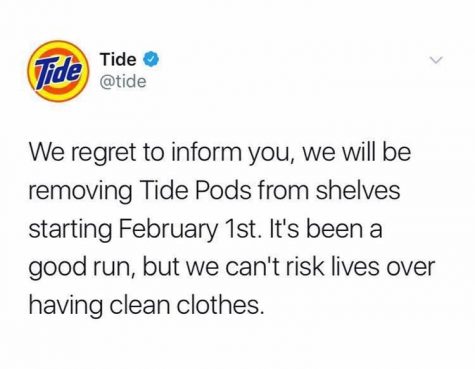The poisonous pods challenge
February 14, 2018
The Internet is a wild place, full of challenges children and teenagers promote. However, no one thought it would go as far as eating the “forbidden fruit” – Tide pods.
The concept to eat Tide pods started from a popular satirical news website called The Onion. In 2015, they wrote a story about a kid wanting to eat one of the laundry detergents due to its candy-like appearance.
After this article went viral, two years later, CollegeHumor produced a video based on this article, applying it to adults. The video depicts a college student eating a bowl of Tide pods after thinking about how delicious they looked, and the man ended up going to the hospital in an ambulance, clearly poisoned. The video was not real, but did make the concept even more noticed.
 “Considering that eating one can kill you, the topic shouldn’t be joked about, especially when you’re talking about kids eating them,” freshman Maggie Huber, who read the article and watched the video, said. “I feel like by posting the story and the video, The Onion and CollegeHumor was putting ideas into people’s head, intentionally or not. I don’t think either sources truly considered the repercussions.”
“Considering that eating one can kill you, the topic shouldn’t be joked about, especially when you’re talking about kids eating them,” freshman Maggie Huber, who read the article and watched the video, said. “I feel like by posting the story and the video, The Onion and CollegeHumor was putting ideas into people’s head, intentionally or not. I don’t think either sources truly considered the repercussions.”
Although it’s common for young children to see the pretty colors and the candy-like appearance and want to explore, the numbers of teens eating them is surprising. According to the American Association of Poison Control Centers, “there were more than 12,299 reported exposures to highly concentrated laundry detergent pods in 2017. Most reports involved children ages five and under. That’s down 14 percent since 2015, when the centers answered more than 14,000 calls.”
Kids aren’t the only ones confusing the product, though. According to Time, it may also pose a risk to elderly adults who have Alzheimer’s or dementia. Last year, 167 incidents involving adults older than 60 were reported.
It wasn’t until just recently that the Tide pod became a challenge and is all over social media apps Instagram and Twitter. Meme accounts and regular people alike are either posting a video of someone or themselves biting into one, or making tweets about how they’re “snacks” or the “forbidden fruit”. Even some NAHS kids have joked about it or participated in the challenge.
“My friends and I put tide pods on a pizza we made simply as a joke,” sophomore Logan Bunch said. “We all thought it would be funny, but the actual challenge isn’t funny at all. People have died from it or could die. What we did was just us messing around and never actually ate the pizza with the pods on it.”
Possibly the only upside in this challenge is for the actual brand Tide. Due to the challenge gaining so much attention, consumer consideration of buying the product has actually increased. Although one might think people would rather not buy it now that it’s killing people, it’s actually done the opposite. According to YouGov, “on December 31, 2017, 38 percent of consumers would consider buying Tide the next time they were shopping for household or personal care items. That number grew three percentage points to its current 41 percent in 2018.”
“Tide can’t really complain about it all, even though they’re getting backlash,” Bunch said. “Let’s be honest, their increase in sales, which means increase in profit, is what they really care about. Their packaging even says do not eat. Any statements from Tide is just them trying to avoid hot water from the public.”
There was even a fake Tweet saying that Tide was going to discontinue the product starting February first. Many noticed it, thinking it was real and sharing it, but upon further inspection, if you look on Tide’s actual twitter, there’s no such tweet. However, some may wonder if the idea in general is a smart move considering all that’s occurred, or if it’s not Tide’s fault.
“I believe they should not stop selling them because I don’t think it’s the parent fault or their parenting style,” junior Olivia Walters, social media user, said. “Kids want to fit in and look cool, and I think they just choose this item at random and continued with it. I do think parents should keep them out of reach if they have reasons to believe their children are not responsible enough to be trusted around them.”
However, Tide has been putting out many, real tweets telling people not to eat them, as well as poison control centers, and other authorities alike. Until then, teaching children and teens to not confuse a pod with a piece of candy is what Tide recommends.

